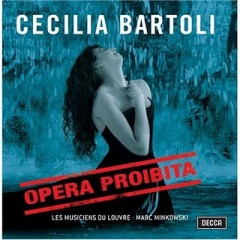Cecilia Bartoli - Opera Proibita (2005)
Cecilia Bartoli - Opera Proibita (2005)

01. Serafini al nostro canto, cantata for 3 voices & instruments Aria della Pace. All'arme sì accesi guerrieri
by Alessandro Scarlatti
02. Il giardino di rose: La SS Vergine del Rosario, oratorio for soloists & orchestra Aria della Speranza.
Mentre io godo in dolce oblio
by Alessandro Scarlatti
03. Il trionfo del Tempo e del Disinganno, oratorio, HWV 46a Aria della Bellezza. Un pensiero nemico di pace
by George Frideric Handel
04. Il Trionfo della Innocenza, oratorio Aria di Santa Eugenia. Vanne pentita a piangere
by Antonio Caldara
05. La castità al cimento, oratorio (Il Trionfo della Castità) Aria di Flavia. Sparga il senso lascivo veleno
by Antonio Caldara
06. Il Sedecia, re di Gerusalemme, oratorio for soloists, chorus, instruments & continuo Aria di Ismaele.
Caldo sangue
by Alessandro Scarlatti
07. Il trionfo del Tempo e del Disinganno, oratorio, HWV 46a Aria del Piacere. Come nembo che fugge col vento
by George Frideric Handel
08. Il giardino di rose: La SS Vergine del Rosario, oratorio for soloists & orchestra Recitativo ed aria della Carità.
Ecco negl'orti tuoi...Che dolce simpatia
by Alessandro Scarlatti
09. San Filippo Neri, oratorio for soloists, trumpet, strings, lute & continuo Recitativo ed aria della Carità.
Qui resta...L'alta Roma
by Alessandro Scarlatti
10. Il trionfo del Tempo e del Disinganno, oratorio, HWV 46a Aria del Piacere. Lascia la spina, cogli la rosa
by George Frideric Handel
11. Il Sedecia, re di Gerusalemme, oratorio for soloists, chorus, instruments & continuo Recitativo ed aria di Ismaele.
Ahi! qual cordoglio...Doppio affetto
by Alessandro Scarlatti
12. Oratorio per Santa Francesca Romana Aria di Santa Francesca. Sì piangete pupille dolenti
by Antonio Caldara
13. Il Martirio di Santa Caterina, oratorio Recitativo ed aria dell'Impertrice Faustina.
Ahi quanto cieca...Come foco alla sua sfera
by Antonio Caldara
14. La Resurrezione, oratorio, HWV 47 Aria dell'Angelo. Disserratevi, o porte d'Averno
by George Frideric Handel
15. La Resurrezione, oratorio, HWV 47 Recitativo ed aria di Santa Maria Maddalena. Notte funesta...Ferma l'ali
by George Frideric Handel
Performer: Cecilia Bartoli – Mezzo-Soprano Yasunori Imamura - Baroque Guitar, Theorbo Sebastian D'Herin - Harpsichord, Organ Yann Miriel - oboe Jory Vinikour - Harpsichord, Organ Eric Bellocq - Baroque Guitar, Theorbo Nils Wieboldt - Cello Jerome Hantai - Viola da Gamba Sebastien Marq - flute Les Musiciens du Louvre Marc Minkowski – conductor
Cecilia Bartoli maintains a near-perfect mezzo-soprano instrument, which she patently refuses to expose to material that might damage it; never will we hear Bartoli in voice-destroying roles such as Carmen nor in heavyweight mezzo parts such as those encountered in Wagner's Ring cycle. Even though she is a "mainstream" classical artist, the most "modern" composer she has recorded is Pauline Viardot, and even the Decca releases that established her as a star stick to composers such as Mozart, Beethoven, and Rossini. Bartoli eschews powerful vocal production in favor of greater flexibility, an ideal match for Baroque and Classical literature. Although one would not have pegged Bartoli as an "early music specialist" based on her earlier recordings, clearly she has found a place as an expert interpreter of such music. In Opera Proibita, where she is accompanied by the redoubtable Marc Minkowski and Les Musiciens du Louvre, it is hard to imagine anyone doing better in this material, over half of it never before recorded.
Opera Proibita restricts itself to a brief period in the early eighteenth century when opera was temporarily banned, owing to its alleged fostering of lewd and lascivious behavior in Italian society. During this time, composers adapted by writing highly operatic passages for the still legal form of oratorio, or developing formats such as the "Introduzione," a highly florid kind of introduction to the Latin mass that was eventually likewise struck down by the church. Although these recitatives and arias from oratorios are taken from composers ranging from George Frideric Handel and Alessandro Scarlatti to Antonio Caldara and are presented apart from the works from which they belong, there is a certain unanimity of style among them. Opera Proibita is sequenced for emotional impact rather than in a historical context, which makes for good listening even if one isn't able to keep straight who wrote what -- in this case, it almost doesn't make a difference. Bartoli is clearly the star of the show, imbuing Scarlatti's recitative and aria combo Ahi! Qual cordoglio...Doppio affetto with a blend of piety, drama, and pathos. Her sense of pitch, even in rapid fire passages of stuttering sixteenth notes, is unfailingly true; just listen to how the voice interacts with the oboes in Handel's Disserratavi, o porte d'Averno. Bartoli almost seems more in tune than the oboes do.
Opera Proibita contains a fair amount of the fireworks expected by fans familiar with her Vivaldi disc with Il Giardino Armonico; however, far more time is spent in reflective, pious, and calm music that is very easy on the ears. As always, Bartoli sounds fabulous here, and Opera Proibita will prove immensely satisfying to any listener who has an appreciation for the capabilities of the human voice as an instrument. --- Uncle Dave Lewis, Rovi
Zmieniony (Poniedziałek, 04 Luty 2013 16:36)








